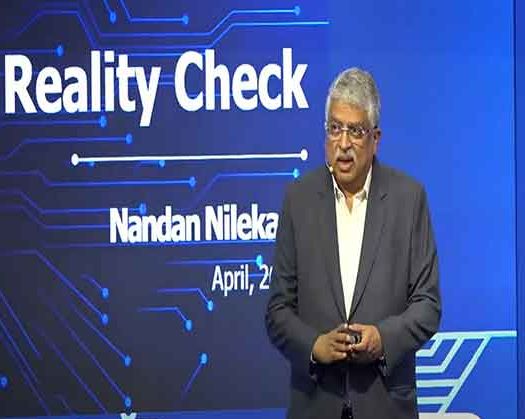New Delhi: Nandan Nilekani, co-founder of Infosys, has presented an ambitious vision for the future of startups in India, predicting that the nation will host one million startups by 2035, a significant increase from the mere 2,000 recorded in 2015.
During his address at the Carnegie Global Tech Summit, Nilekani, who also serves as the founding Chairman of UIDAI (Aadhaar), emphasized that the large-scale implementation of AI in India is supported by a decade of digital transformation.
"Startups have been addressing various challenges over the years. The key takeaway is that we are on track to have a million of them. Back in 2015, we had around 2,000 startups. Currently, we boast 150,000 startups... and by 2035, we will reach a million," he stated.
"They establish successful companies and pursue IPOs. Each successful startup can overshadow the impact of many others... This cycle is now fully operational. The issues they will tackle include climate change, energy, and space," he elaborated.
Nilekani highlighted the dynamic momentum driving India's entrepreneurial landscape, attributing it to a "virtuous cycle" that promotes ongoing innovation.
"India's achievements in space are a remarkable public narrative," he remarked, noting the growing influence of private innovation in sectors traditionally dominated by the government.
He also discussed the expansion of India's digital public infrastructure.
"On April 4, 2016, Aadhaar reached one billion individuals. UPI was launched on April 11, 2016. The foundational architecture was re-established and introduced with the RBI on September 2, 2016, forming the basis of democratic data. Reliance Jio transformed the mobile industry when it launched on September 6, 2016. The currency withdrawal, known as demonetization, occurred on November 8, 2016, followed by the launch of the Bhim app on December 30, 2016."
He emphasized that these occurrences were not spontaneous but rather the culmination of years of quiet preparation.
"For this to unfold, prior events had to take place. It wasn't as if we simply woke up one day and everything happened. This has been evolving over the last several years. The key takeaway is the necessity of patience in establishing a solid foundation. This process will require time, but if executed properly, significant events will follow. I believe there is hope for everyone, and this time we can accelerate the process because we have a clearer understanding of our objectives."
He noted that AI can provide dynamic contextual information at our fingertips.
"When considering the large-scale implementation of AI in India, it is built upon a decade-long foundation of digital transformation. Currently, the primary languages used on mobile devices are English and Hindi, with user interfaces being touchscreen and static knowledge readily available. Despite this, we have successfully reached over 500 million users. Presently, WhatsApp boasts more than 600 million users in India, while PhonePe has around 350-400 million users, and UPI has 400 million users," he stated.
"As mobile phone penetration increases and we approach a billion devices, what will it take for a billion people to engage with this technology? First, language support will expand beyond just Hindi and English to include all major Indian languages, enhancing accessibility. Second, user interfaces will evolve from keyboard and touch to voice and video. Third, thanks to generative AI and its reasoning capabilities, we will transition from static knowledge to dynamic contextual information that is readily available," he added.
He also addressed the challenges associated with implementing AI in the public sector.
Implementing AI in the public sector presents significant challenges due to its structural limitations. The presence of various ministries and departments creates a territorial mindset that hinders data sharing. Since data is essential for AI to function effectively, it is crucial to find a method to integrate AI across all government sectors, regardless of their origin. Additionally, the public sector faces unique difficulties because maintaining public trust and addressing ethical considerations are paramount, he noted.












